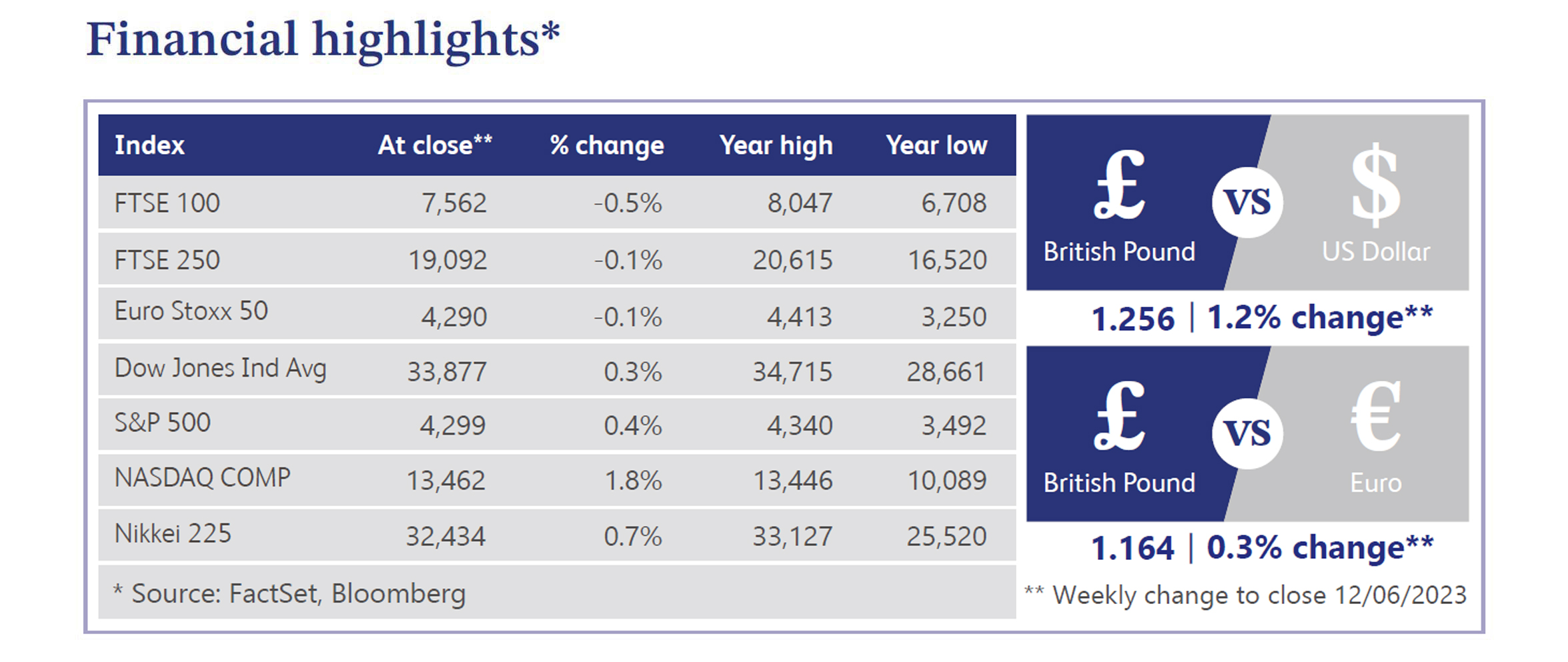
13 June 2023
The UK housing market was one of the key areas of focus this week as UK Halifax house price data was announced. The data showed a flat reading in May, but on an annual basis prices fell 1% versus consensus for a 0.9% drop. This was the first annual decline in prices since December 2012. Halifax did highlight that given the flat monthly reading, the annual decline reflects strong house price growth this time last year. This has shown a shift from the brief upturn in prices seen at the beginning of the year as the impact of higher interest rates feeds through into the market. This is largely impacting those with expiring fixed rate mortgage deals as they need to refinance at higher rates.
Halifax anticipates further downward pressure on prices as confidence is impacted by the expectation of further rate rises. Note that Halifax, which is the country's biggest lender, hiked rates on two-year deals with a 60% loan-to-value ratio to 5.36% overnight, which compared with 4.54% on the 1st June. This has been similar among other lenders and has fuelled expectations that prices may fall steadily towards the year-end and may not bottom out until 2025. Moody’s, one of the leading rating agencies, said that UK house prices are likely to fall 10% over the next two years. The rating agency also stated that a sharper drop could hurt the economy and undermine the credit quality of the sector.
The Bank of England is facing a difficult balancing act. Inflation remains at elevated levels which requires further monetary tightening, but also runs the risk of tipping the economy into a recession. Markets are fully priced for a 0.25% rate hike to 4.75% at the next meeting on 22 June, with expectations of rates reaching 5.5% by the end of the year.
A survey by EY, one of the “Big Four” accounting firms, showed that London remains Europe’s top destination for financial services. Britain saw an increase of 17% on the number of financial services projects it secured in 2022. This is despite the economic downturn and political instability in Westminster and demonstrates the strength and resilience of the UK market.
The Eurozone economy contracted 0.3% in the first quarter, the second consecutive quarter of decline. This puts the Eurozone in a technical recession and was driven by a slowdown in activity, which was exacerbated by the war in Ukraine. Interestingly, Europe’s sovereign borrowers sold €27 billion of debt last week, the busiest week since the onset of the pandemic in March 2020. This shows that investors are still willing to buy debt issued by European governments despite the economic uncertainty caused by the war in Ukraine.

Indivior, a global pharmaceutical company, saw its shares surge approximately 16% last week as the company announced an agreement to a partial settlement over its antitrust litigation in the US. Indivior has agreed to pay 41 states and the District of Columbia $102.5 million. Payment will be made from cash resources in June 2023. The company has a strong cash position and the announcement was reassuringly in line with the overall estimated provision.
Croda International, the British speciality chemicals company, saw a decline in its share price by approximately 15% last week after issuing a trading update detailing that full year 2023 profit is now expected to be lower. This was due to customer destocking in consumer and industrial end-markets. The company announced this is expected to continue into the second half of the year. Destocking in Croda’s Consumer Care division has been well noted, but management commented that Crop Protection started the year well but is now experiencing rapid customer destocking. This led to numerous analysts updating their expectations, resulting in a downgrade for Croda.
Boohoo, the British online fashion retailer, experienced a 14% drop in its share price last week due to analyst downgrades of the stock. The company has been trying to implement a shift towards domestic US fulfilment. Boohoo approved the opening of a US distribution centre when markets had a very different outlook. The expectations at the time for US revenues were likely three times the current run-rate when management agreed to the project. The changed outlook makes it difficult to see how the company will break even on the project, particularly as automation expectations appear difficult to justify. This lowers the expectations of future growth potential, which has therefore been reflected in the price.

Market Commentary prepared by Walker Crips Investment Management Limited.
This publication is intended to be Walker Crips Investment Management’s own commentary on markets. It is not investment research and should not be construed as an offer or solicitation to buy, sell or trade in any of the investments, sectors or asset classes mentioned. The value of any investment and the income arising from it is not guaranteed and can fall as well as rise, so that you may not get back the amount you originally invested. Past performance is not a reliable indicator of future results. Movements in exchange rates can have an adverse effect on the value, price or income of any non-sterling denominated investment. Nothing in this document constitutes advice to undertake a transaction, and if you require professional advice you should contact your financial adviser or your usual contact at Walker Crips. Walker Crips Investment Management Limited is authorised and regulated by the Financial Conduct Authority and is a member of the London Stock Exchange. Registered office: Old Change House, 128 Queen Victoria Street, London, EC4V 4BJ. Registered in England and Wales number 4774117.
Important Note
No news or research content is a recommendation to deal. It is important to remember that the value of investments and the income from them can go down as well as up, so you could get back less than you invest. If you have any doubts about the suitability of any investment for your circumstances, you should contact your financial advisor.